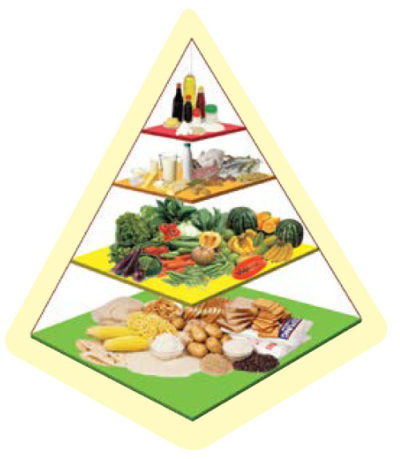A healthy diet ensures that your child’s body receives all the nutrients that it needs. This is critical because malnutrition is one of the most common causes of immunodeficiency worldwide as it can lead to a weakened immune system which could leave his body vulnerable to infections. The World Health Organization links malnutrition with 45% of all child deaths globally as their weakened immune system is less able to deal with severe diseases.
Neglecting to provide him with the proper nutrition would only weaken his immunity, which makes him more vulnerable to catching a cold or falling sick. Getting the right nutrition will help improve his immune system which is his first line of defence against bacteria and viruses. Building a strong immune system will help prevent your child from easily succumbing to infectious diseases. This translates to fewer sick days for school-going children as he will not fall sick so easily. This is also good for working parents as there will be less need to apply for leave in order to care for him when he is sick.
Include All Food Groups Daily
Getting the right nutrition means providing him with a healthy diet that is balanced, served in moderate portions as per the recommended servings (amount), and includes a wide variety of foods in order to meet his nutritional needs. There is no such thing as a single food, drink, or food group that can provide his body with every single nutrient that it needs. All foods in the food pyramid are needed to build stronger immune system.
The base of the pyramid consists mainly of foods such as rice, noodles, wheat or other grains and tubers. These are important sources of energy and if it is whole grain, it will contain more fibre as well as other phytonutrients your body needs. You can help boost his immunity by ensuring that he gets all the nutrients that his body needs, including energy. However, while energy is required to fuel his immune system, do not encourage the consumption of foods that are high in energy but low in nutrients (energy -dense) such as foods or drinks that are high in sugar or deep fried with oil.
Fruits and vegetables form the second level of the food pyramid are good sources for antioxidants, phytochemicals, vitamins and minerals. Vitamin C present in fruits and vegetables can boost immune system thus helping prevent illnesses such as common cold or flu. Vitamin C can also help reduce recovery time from colds.
Meat, fish and shellfish, poultry and dairy products make up the third level of the food pyramid. These foods are good sources of protein, zinc and iron, which play important roles in the immune system. Protein is important in producing antibodies – a major component of the immune system. This helps the body to fight against harmful bacteria and viruses, and prevent infections. The immune system produces many different antibodies to fight these germs. The body needs zinc to help produce white blood cells to fight infection, and iron to help strengthen immunity, thus preventing susceptibility to infectious diseases (e.g. diarrhoeal diseases, respiratory tract infections i.e. pneumonia). Internal organs like chicken/ox liver is rich in Vitamin A and it has been reported that deficiency in this vitamin may lead to an increase in severity and frequency of various infections.
Dairy products which are also on the third level of the pyramid, are good sources of calcium and Vitamin D – both of which are critical for turning body’s immune responses on and off at the appropriate times. In fact, the body’s absorption of calcium is facilitated by Vitamin D. Dairy products are not the only source as there are many processed foods such as cereals, breads or fruit juices that are fortified with calcium and/or Vitamin D. Other minerals such as magnesium which is found in milk and dairy products, is strongly linked with both nonspecific and specific immune response, otherwise known as innate and acquired immune response.
The Malaysian Food Pyramid is a useful tool to help you visualise how much of each food group he should eat every day. As a general guide, eat more of the foods that are at the bottom of the pyramid, and less of the foods that are at the top of the pyramid. In this way, you will ensure that he receives all the nutrition his body needs for better immunity.
Healthy Habits
In addition to this, there are other healthy habits which you should cultivate in your child to help improve his health and either support or stimulate his immune system.
- Drinking enough water daily: Aim for at least eight glasses of plain water daily (more may be required if it is a hot day or if he is involved in any strenuous games or physical activities). Water is critical as his body (and his immune system) needs it in order to function properly.
- Eating sufficient probiotic-rich foods daily: Probiotics, or ‘good’ bacteria’, are critical in maintaining his gut microflora, thus helping to maintain his digestive health and immune system. These can be found in fermented foods such as yoghurt, cultured milk drinks, cheese, tempeh, or Chinese hum choy.
- Being physically active every day: A minimum total of 60 minutes of moderate-intensity physical activity (brisk walking, swimming, sports and outdoor games i.e. badminton, skipping, cycling, playing catch in the park, etc.) is recommended which not only helps keep his body healthy but also stimulates his immune system.
- Getting enough sleep: Insufficient sleep not only causes a drop in cognitive performance and aggravates behavioural problems, it can even lead to a suppressed immune system. School-going children aged 6-13 years old need between 9-11 hours of sleep.
By combining all these tips, you will be able to help boost your child’s immunity. Remember that a healthy diet is just the first step towards building up his immune system. While it is certainly very important, it is not the only aspect of a healthy lifestyle that you should focus on. In order to reap the most benefits, your approach should be a holistic one that incorporates other aspects of a healthy lifestyle as well.
An educational collaboration with Nutrition Society of Malaysia.








Comments